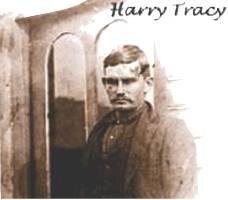The Old West’s last outlaw
HOLY COW! HISTORY
Mark Powell is on family leave. This columb is reprint from 2016.
You know Jesse James and Billy the Kid. You’ve watched “Butch …
This item is available in full to subscribers.
Subscribe to continue reading. Already a subscriber? Sign in
Get 50% of all subscriptions for a limited time. Subscribe today.
Please log in to continueNeed an account?
|
The Old West’s last outlaw
HOLY COW! HISTORY
Mark Powell is on family leave. This columb is reprint from 2016.
You know Jesse James and Billy the Kid. You’ve watched “Butch Cassidy and the Sundance Kid,” and heard tales of John Wesley Hardin and the Dalton Brothers. All legends in their time, all outlaw icons today.
The lawlessness that began with the Civil War’s conclusion stretched into the earliest days of the 20th Century. And when that era finally wrapped up, who was its final desperado?
Meet Harry Tracy, who went down with guns blazing in 1902. He was wildly famous, much like John Dillinger and Bonnie and Clyde were later on. If the FBI had existed, he would have been Public Enemy #1.
Harry was a walking bundle of contradictions. Strikingly handsome, with an Abercrombie & Fitch model’s disdainful smirk, he could be excessively polite and courteous. Women adored him, and he revered them as symbols of Victorian sanctity, especially his mother. He could be charming company, even funny when he so chose.
He could also be withdrawn, lonely and moody. He had deadly aim with a gun and was savagely dangerous. Harry had bad luck and made bad choices, and even when he tried to do the right thing, he got an especially bad break.
He was born Harry Severns in Pittsville, Wisconsin, in 1875. His father was described as “fanatically religious,” and there are dark hints the boy was physically abused. At 16, Harry couldn’t take it anymore. He was already a crack shot, bitter, and deeply in love.
Harry’s sweetheart was Eugenie Carter, and he desperately wanted to marry her. But that took money. So he robbed a post office of $160. He was kissing Eugenie goodbye when the sheriff spotted him and opened fire, quickly becoming the first man Harry sent to his grave.
When he turned up later in Missouri, Harry had acquired the surname of Tracy. He hid in an Ozarks shack for a while, then forced two men identified as “bums” to help him rob eight hunters, making off with $750. Harry hadn’t even turned 18 yet.
He bounced around from Cincinnati to Chicago and then went. Harry recognized the importance of having money, but he wasn’t willing to work for it. His version of going to an ATM was pulling an armed robbery and living off the loot until it ran out.
In Salt Lake City, a holdup went bad and he was invited to visit the inside of Utah’s Penitentiary. But Harry wasn’t behind bars
for long. He outfoxed
his guard, slipped away and started over in Colorado. In 1894, at age 19, a Colorado Springs saloon holdup was bungled, and two lawmen were killed. Next stop was Montana, where he joined a gang of horse and cattle thieves. The leader often got drunk and beat his Native-American wife. This offended Harry’s exalted notion of womanhood, and he ended the beatings by putting a bullet through the abusive husband’s head.
Harry dropped out of sight for a while after that, roaming the West and brooding over Eugenie, his lost love.
Then, a miracle happened: out of the blue, he ran into her in Cripple Creek, Colorado. They were soon married. He seemed genuinely interested in turning over a new leaf. He bought a little ranch in Idaho, and for a few months the newlyweds were blissfully happy.
Two friends were accused of stealing horses, and they headed to Harry’s ranch to hide out. A posse tracked them down and surrounded the place.
For once, Harry had no part in this crime. So he and Eugenie decided to flee an increasingly ugly situation. They tried to run for it. The posse opened fire, and Eugenie was hit. Harry went berserk and started shooting like a madman, killing three posse members.
Harry held Eugenie in his arms as she died, then gently placed her body on their bed. He mounted his horse and road off into the night. His one sincere attempt at “going straight” had ended in bloody failure.
Harry blamed lawmen for his woes.
After a few years of riding and robbing his way around the West (where he claimed to have briefly been part of Butch & Sun-dance’s Hole in the Wall Gang), Harry turned up in the Pacific Northwest as the 1800s drew to a close.
He met a fellow bad guy named David Merrill. They committed one holdup after another until they were caught and hustled off to Oregon’s Penitentiary, where the final chapter of Harry’s bloody saga unfolded.
Harry and Merrill had a buddy smuggle two rifles into the prison’s stove factory.
They made their break on June 9, 1902, killing 3 prison guards and 3 civilians. Many more were killed in the next few months, including Merrill in a bizarre duel.
The public was nearing panic mode. The governors of Washington state and Idaho offered $6,000 in rewards for Harry, dead or alive.
His luck finally ran out on August 6, 1902. He was cornered in Creston, Washington and shot in the leg during an ambush by a posse. Surrounded, Harry committed suicide to avoid capture – age 27.
Other items that may interest you










Comments
No comments on this item Please log in to comment by clicking here